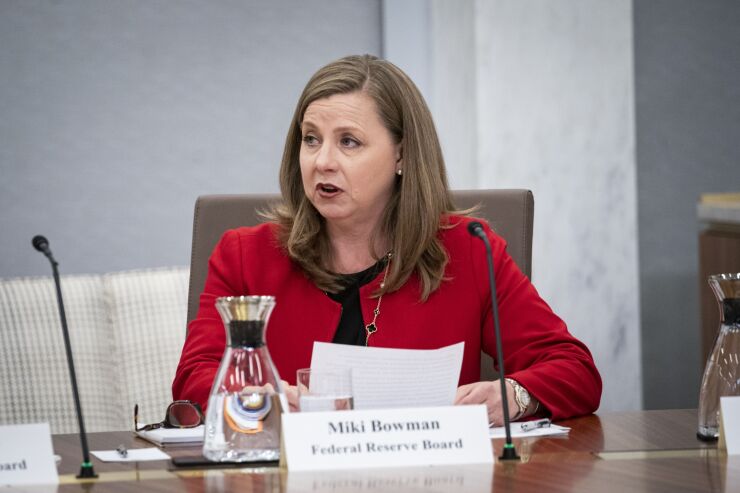
Federal Reserve Board Gov. Michelle Bowman does not believe recent bank failures should be used to
She also called for the Fed to commission an
"This would be a logical next step in holding ourselves accountable and would help to eliminate the doubts that may naturally accompany any self-assessment prepared and reviewed by a single member of the Board of Governors," Bowman said in a speech Friday morning during a closed event hosted by the Program on International Financial Systems in Frankfurt, Germany.
Bowman said the bank runs that toppled Silicon Valley Bank,
She also supported targeted changes to regulation if further review identifies specific shortcomings, noting deposit insurance and treatment of uninsured deposits as potential areas of change. But she said that the banking system is well capitalized and any
"The unique nature and business models of the banks that recently failed, in my view, do not justify imposing new, overly complex regulatory and supervisory expectations on a broad range of banks," Bowman said. "If we allow this to occur, we will end up with a system of significantly fewer banks serving significantly fewer customers. Those who will likely bear the burden of this new banking system are those at the lower end of the economic spectrum, both individuals and businesses."
In her speech, Bowman made scant mention of Fed Vice Chair for Supervision Michael Barr's report on the failure of Silicon Valley Bank, which was completed at the end of last month and
Barr's report cites both regulatory changes enacted by the Fed in 2019 and an overall shift in supervisory sentiment under the leadership of former Vice Chair for Supervision Randal Quarles as factors contributing to Silicon Valley Bank's demise.
Barr's report, which was compiled by the Fed's top regulatory advisor Kevin Stiroh and included interviews with supervisory staffers, does not propose new policy changes but suggests that several preexisting proposals could be beneficial moving forward. These include changes to stress testing, a long-term debt requirement for large regional banks and a revision of capital standards.
While Bowman did not address Barr's findings directly, she noted that there has been a "drumbeat calling for broad, fundamental reforms for the past several years." She added that any efforts to shift away from the tailored approach to regulation — which reserves the strictest standard for the largest, most complex banks — or risk-based supervision is "the wrong direction for any conversation about banking reform."
"Calls for radical reform of the bank regulatory framework — as opposed to targeted changes to address identified root causes of banking system stress — are incompatible with the fundamental strength of the banking system," she said. "I am extremely concerned about calls for casting aside tiering expectations for less-complex institutions, given the clear statutory direction to provide for appropriately calibrated requirements for these banks."
During her speech, Bowman also highlighted changes to banking culture to which supervisors must adapt. The emphasis on innovation in the banking space and the rise of banking-as-a-service, she said, led to an influx of "non-bankers" from less regulated industries, namely tech.
Bowman, the former banking commissioner of Kansas, said some of these new entrants do not regard the shared risk management relationship of banks and supervisors as highly as those who have spent their whole careers in banking. Many, she said, "espouse an 'ask for forgiveness, not permission' mentality when it comes to regulation and compliance."
Moving forward, she said, supervisors should use all their tools to make sure these newcomers understand the risks they are taking, especially if they are core issues that could threaten a bank's solvency.
"These include concentration risk, liquidity risk and interest rate risk," Bowman said. "We have the tools to address these issues, but we need to ensure that examiners focus on these core risks and are not distracted by novel activity or concepts."
Bowman also said the recent crisis and speed at which it played out are reasons for reevaluating the technology at its disposal to mitigate bank runs. She said tools, such as the discount window, are "important but not effective mechanisms to rescue troubled institutions." She noted that such tools are not available 24 hours a day, seven days a week and in some cases rely on outdated technology.
"These tools must be nimble and flexible to support the banking system during times of stress," she said. "I think it is important that we understand how well these tools functioned in early March as two U.S. banks experienced stress and ultimately failed, and what can be improved regarding timeliness or effectiveness of fulfilling the lender-of-last-resort function."






